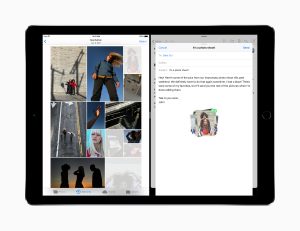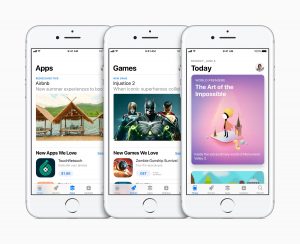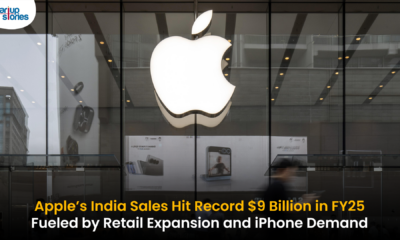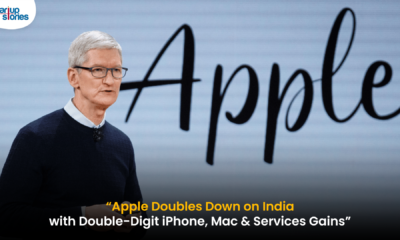Latest News
The Latest Features of Apple iOS 11

The latest software update for iPhone and iPad was released during the WWDC keynote speech on 5 June. It is said to be the biggest software release ever for iPad with powerful multitasking features along with new AR experiences.
This major update to one of the world’s leading mobile operating system will bring even more intelligence and a new voice for Siri. Other updates include the ability to make payments, professional capabilities to photos, on device machine learning potential, augmented reality with the option to build apps by using virtual content on top of real world scenarios only to name a few.
It is a good time for iPad users as the new update will allow a new customizable dock that provides quick access to frequently used apps and documents from any screen. It will also be easier for iPad users to switch between active apps with a redesigned app switcher, used in Split View and Slide Over.

A new addition called Files is designed to make life easier especially for users with data stored across multiple apps. Files will help you to create folders and stay organized by storing all documents from Mail, cloud or across providers in one easy to use place.

Craig Federighi, Apple’s senior vice president of Software Engineering demonstrated other major features of the new OS including the synchronized messages across iCloud, iOS and macOS. Apple Pay will now be able to include person to person payments with the Apple Pay Cash Card, where peer transaction funds can be stored and transferred to personal accounts.
Apple Assistant Siri will start to sound more natural while responding to users and perform translations from English to Chinese, French, German, Italian or Spanish. Siri will also be able to learn from personal usage to give useful suggestions. Apple control center has also been completely redesigned for quick access to frequently used controls along with a new lock screen for a convenient way to see all notifications in one place.
Apple is also shifting to High-Efficiency Image File Format (HEIF) to shrink the amount of storage that photos take up on iPhone. The camera app will also get new tricks such as Bounce and Loop that can be applied to Live Photos and offers optical image stabilization for portrait mode images taken using flash in HDR.
The new OS will have AR built in directly into the core of the iOS allowing developers to build apps that convincingly blend augmented reality entertainment over real world scenes. A new Home app was also announced that will be able to control HomeKit compatible smart home gadgets.
The App Store received a complete makeover with the addition of a new ‘Today’ tab which shows a collection of news apps and a new daily list centered around particular themes and more. The App Store will also have a second new tab dedicated to Games that will feature both new and popular games, as well as in-app purchases. App Pages will be able to display new previews, quotes, and stories along with a quicker approval for new apps.

What do you think about the new updates coming to the iPhones and iPads? Let us know in the comments below or write to us at [email protected]
Latest News
D2C Brand Neeman’s Raises $4 Million for Tier 2/3 Store Expansion & Eco-Friendly Shoes

Hyderabad, January 13, 2026 Neeman’s, India’s leading D2C footwear brand famed for sustainable shoes and patented PIXLL® technology, has raised $4 million from existing investors. This funding boosts its cumulative capital past $10 million since 2015, with a post-money valuation nearing $50 million. CEO Vijay Chahoria emphasized offline retail as the “next frontier,” planning 50+ new stores in Tier 2/3 cities like Jaipur and Lucknow to blend eco-friendly innovation with hands-on customer experiences.
In India’s booming D2C ecosystem where footwear sales hit ₹1.2 lakh crore in 2025 Neeman’s targets hybrid retail amid high online CAC and 25-30% returns. Backed by vegan, machine-washable shoes priced ₹2,000-4,000, the brand leverages PIXLL® (5x more breathable than leather) for carbon-neutral comfort. Recent 5x revenue growth to ₹100 crore ARR, 1M+ pairs sold via Myntra and stores, and awards at India D2C Summit 2025 position it ahead of rivals like Paaduks.
Neeman’s offline expansion India eyes the $15B sustainable footwear market by 2028, fueled by PLI schemes, Gen Z’s 70% eco-preference (Nielsen), and Southeast Asia exports. Challenges like real estate costs are offset by data-driven inventory and omnichannel QR tech. Watch for Q1 2026 launches in Hyderabad and Bengaluru redefining D2C success through authentic, “Wear the Change” branding.
Latest News
Centre Mulls Revoking X’s Safe Harbour Over Grok Misuse

The Centre is weighing the option of revoking X’s safe harbour status in India after its AI chatbot Grok was allegedly misused to generate and circulate obscene and sexually explicit content, including material seemingly involving minors. The IT Ministry has already issued a notice to X, directing the platform to remove unlawful content, fix Grok’s safeguards, act against violators, and submit a detailed compliance report within a tight deadline. If the government finds X’s response inadequate, it could argue that the platform has failed to meet due‑diligence standards under Indian law, opening the door to harsher action.
Under Section 79 of the IT Act, safe harbour protects intermediaries like X from being held directly liable for user‑generated content, provided they follow due‑diligence rules and promptly act on legal takedown orders. Revoking this protection would mean X and its officers could be exposed to criminal and civil liability for obscene, unlawful, or harmful content that remains on the platform, including AI‑generated images from Grok. This prospect significantly raises X’s compliance risk in India and could force tighter moderation, stricter AI controls, and more aggressive removal of flagged posts.
The Grok episode also spotlights the regulatory grey zone around generative AI, where tools can create harmful content at scale even without traditional user uploads. Policymakers are increasingly questioning whether AI outputs should still enjoy the same intermediary protections as conventional user posts, especially when they involve women and children. How the government ultimately proceeds against X over Grok misuse could set a precedent for AI accountability, platform responsibility, and safe harbour interpretation in India’s fast‑evolving digital ecosystem.
Latest News
How Pronto Is Redefining 10-Minute Home Services in India with a $25 Million Fundraise

Home services startup Pronto is in advanced talks to raise about $25 million at a near-$100 million valuation, underscoring strong investor confidence in India’s fast-growing 10-minute home services market. This potential round would be the company’s third major funding milestone after its $2 million seed and $11 million Series A in 2025, backed by marquee investors such as General Catalyst, Glade Brook Capital, Bain Capital and new participant Epiq Capital. The fresh capital is expected to further strengthen Pronto’s positioning as a leading tech-led household help platform for urban consumers.
Pronto operates a 10-minute on-demand home-services platform that connects users with trained, background-verified workers for everyday tasks like sweeping, mopping, utensil cleaning, laundry and basic cooking. Using a hub-and-spoke, shift-based model, the startup stations workers at hyperlocal hubs, enabling sub-10-minute fulfilment and more predictable earnings compared to the informal domestic-help market. Founded in 2024 by Anjali Sardana and based in Delhi NCR, Pronto has already expanded from Gurugram into major cities such as New Delhi, Mumbai, Bengaluru and Pune, and is handling around 6,000 daily bookings with nearly 1,300 active professionals as of December 2025.
The upcoming $25 million fundraise is expected to be used to enter more metros, deepen presence in existing neighbourhoods with additional hubs and upgrade Pronto’s technology for smarter routing, shift planning and real-time operations. A significant portion of the capital will also go into training, retention and benefits for its workforce to maintain consistent service quality at scale, especially as competition heats up from rivals like Snabbit and Urban Company in the rapid home services space. This near-$100 million valuation not only validates Pronto’s model but also highlights a broader shift toward organised, tech-driven domestic-help solutions in India’s largely informal home-services market.















MM88
November 6, 2025 at 8:50 pm
Với giao diện mượt mà và ưu đãi hấp dẫn, MM88 là lựa chọn lý tưởng cho các tín đồ giải trí trực tuyến.
谷歌蜘蛛池
November 7, 2025 at 8:47 pm
利用强大的谷歌蜘蛛池技术,大幅提升网站收录效率与页面抓取频率。谷歌蜘蛛池
Kuwin
November 8, 2025 at 12:19 pm
kuwin sở hữu kho game đa dạng từ slot đến trò chơi bài đổi thưởng, mang đến cho bạn những giây phút giải trí tuyệt vời.
谷歌外推
November 9, 2025 at 12:33 am
采用高效谷歌外推策略,快速提升网站在搜索引擎中的可见性与权重。谷歌外推
iwin
November 11, 2025 at 7:37 pm
iwin – nền tảng game bài đổi thưởng uy tín, nơi bạn có thể thử vận may và tận hưởng nhiều tựa game hấp
站群程序
November 12, 2025 at 3:25 am
搭载智能站群程序,自动化搭建与管理,为SEO项目提供核心驱动力。站群程序
MM88
November 16, 2025 at 10:43 am
Khám phá thế giới giải trí trực tuyến đỉnh cao tại MM88, nơi mang đến những trải nghiệm cá cược thể thao và casino sống động.
1win
December 12, 2025 at 6:37 am
https://t.me/s/be_1win/338
Casino
December 14, 2025 at 2:26 pm
https://t.me/s/ef_beef